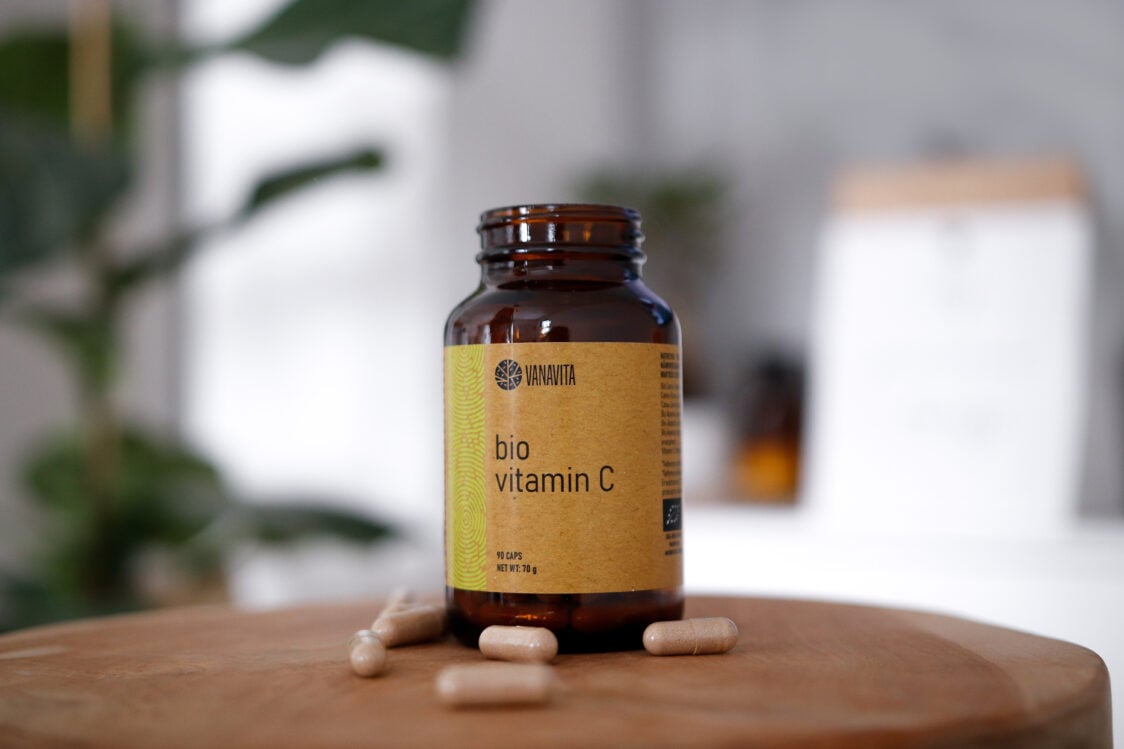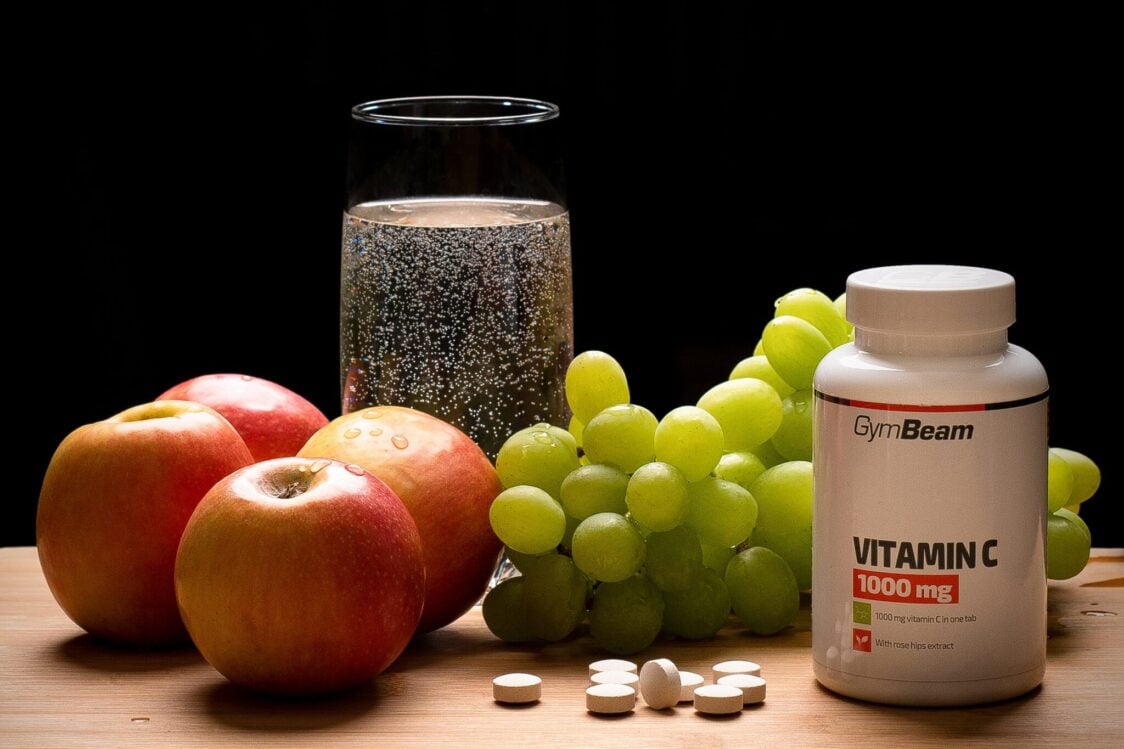Table of Contents
Vitamin C is one of the most popular dietary supplements. Most often you reach for it when you feel that an illness is coming on and you want to strengthen your immunity. It can be obtained through oranges, lemon teas and supplements, believing that it will get you back on your feet quickly. Vitamin C is one piece of the puzzle that helps to fight colds and other illnesses. What is behind its effects? And what about supplementation for athletes, should they take vitamin C after every workout to promote recovery? Find out all this and much more in today’s article.
It took humanity a while to figure out why it’s good to eat fresh vegetables and fruits. Unfortunately, it also cost the lives of sailors who, after long months on board a ship, suffered from a severe vitamin C deficiency that manifested itself in a life-threatening disease called scurvy. All that would have been needed to avert it would have been to pack citrus fruits on the ship to supply the sailors with this essential vitamin. Fortunately, they too figured it out over time, minimising the risk of contracting scurvy. Unfortunately, in Central Europe, oranges or tangerines did not grow on trees, so one had to make do with sauerkraut or potatoes, which are still one of the biggest sources of vitamin C in many countries.
In this article you can learn about the effect of vitamin C on:

What is vitamin C?
Vitamin C or ascorbic acid belongs to the group of water-soluble vitamins. It is found naturally in various foods, but can also be taken through supplements. Unlike most mammals, the human body cannot synthesise this substance. For this reason, it is one of the essential nutrients that must be regularly taken, whether this is in the form of a varied and balanced diet or through supplements. [1]
Why is vitamin C so important?
- It belongs among the antioxidants that help protect cells from oxidative stress. It is directly involved in the neutralisation of harmful free radicals and reactive forms of oxygen (Reactive Oxygen Species – ROS). However, it also acts indirectly, through its ability to restore the antioxidant properties of vitamin E. [2]
- Supports immune function. It plays a role in the proper functioning of immune cells such as neutrophils or macrophages that fight viruses, bacteria and other foreign substances in the body. [3]
- It also contributes to the maintenance of normal immune system function during and after intense physical exercise. After a hard workout, immunity can be weakened, so athletes should pay even closer attention to their intake of this substance.
- It promotes proper collagen production for the normal function of the skin, gums, teeth, blood vessels and cartilage. It is also necessary for maintaining a youthful appearance, healthy teeth and musculoskeletal system. [1]
- It is also needed for the production of carnitine, a substance important for the metabolism of fat, specifically its conversion to energy. Also thanks to this mechanism, vitamin C contributes to the reduction of fatigue and exhaustion. In the body, it is also used in the formation of the neurotransmitter noradrenaline. [1, 6]
- It increases the absorption of iron from plant sources (non-heme iron), which has a lower bioavailability than animal iron (heme iron). This function is especially important for vegetarians, vegans and other people whose diets are dominated by plant foods. [1]
- Contributes to normal metabolic function. This is particularly related to the metabolism of proteins such as the previously mentioned collagen. It is also involved in the metabolism of fats through the synthesis of carnitine. [1]
- Supports nervous system function. It is involved in processes related to the differentiation, maturation and survival of nerve cells (neurons). [4]
- It also contributes to the proper functioning of the psyche by contributing to the release of serotonin, catecholamines and other substances associated with mood and psychological experiences. [5]
If you want to learn about the effects of other vitamins, read our article The Complete Guide to Vitamins: What They Do, How to Know When You’re Deficient, and How Much to Take.

What are the health benefits of vitamin C?
We now know that vitamin C is not only needed for one’s immunity. Without it, the nervous system would not function properly, nor would the production of collagen, carnitine and many other processes in the body. Thanks to these complex effects, a sufficient intake of ascorbic acid can have a positive effect in many areas of daily life.
1. It can reduce the length of an ongoing cold
It’s no coincidence that at the first sign of a cold, thoughts of buying oranges and drinking tea with lemon come to mind. So without thinking for long, you try to increase your intake of vitamin C and hope that it will lead the immune system army, thus preventing the outbreak of illness. However, can science also prove that vitamin C in higher doses (200-2000 mg) can really defeat the harmful bacteria and viruses that want to make an amusement park out of your body?
What does modern science say about the effect of vitamin C on colds?
- Unfortunately, the preventive effects of vitamin C on the development of colds and flu are not supported by current studies on the general population. [8]
- At higher doses (up to 2000 mg), a reduction in cold duration of 8-14% has been observed. However, this is not the case for people who start taking vitamin C after the onset of the first symptoms. [8]
- These studies also found that people who took vitamin C regularly had milder cold symptoms. [7]
- In athletes who engage in high-intensity activities (marathon runners), vitamin C supplementation led to a 50% reduction in the risk of colds. After such intense exercise, there may be a temporary weakening of immunity, so the importance of vitamin C is greater here. [7-8]
Vitamin C is not a miracle that works as an impenetrable shield that reliably protects you from getting a cold. On the other hand, regular supplementation can shorten the time you spend struggling with a cold and other annoying symptoms. However, you may feel an even greater effect if you are a busy athlete who trains at a high intensity, for several hours at a time or several times a day. This is because strenuous workouts can weaken your immunity, increasing your risk of developing colds and other respiratory illnesses.
If you are wondering what else can help you boost your immunity, read our article 15 Ways to Boost Your Immune System and Protect Your Health.

2. May reduce the risk of cardiovascular disease
Scientists became more interested in the effect of vitamin C on cardiovascular health when they noticed in studies that people with high blood pressure, atherosclerosis or heart disease were linked to a deficiency of the substance. Thanks to further studies, they found out that this is not a coincidence and that a sufficient intake of vitamin C can be beneficial in this respect as well.
What is behind the positive effect on heart and blood vessel function?
- First and foremost are its antioxidant effects. This has been proven, for example, for the cellular enzyme (eNOS) and its cofactor tetrahydrobiopterin. These components of blood vessels are very susceptible to oxidative damage that could reduce their activity and function. Thus, vitamin C supplementation may help maintain proper blood vessel function even when oxidative stress is higher due to these properties. [9]
- Vitamin C can also increase the production of nitric oxide (NO), which is directly related to the dilation of blood vessels (vasoconstriction) and thus optimal blood flow. [9]
- It is also needed for the breakdown (catabolism) of cholesterol. Thus, vitamin C deficiency can lead to cholesterol deposition in the liver, which poses a risk of gallstones, atherosclerosis (hardening of the arteries) and other diseases of the cardiovascular system. [8]
- It seems that vitamin C supplementation can also lead to a reduction in blood pressure in patients who have high blood pressure (hypertension). However, more concrete scientific evidence is needed to confirm this effect. [10]
Healthy fats are also important for heart and blood vessel health. If you are interested in their effects or their food sources, you should not miss our article How Many Healthy Fats to Eat? The Amount of Omega 3 is More Important Than Their Ratio to Omega 6.
You might be interested in these products:
3. Promotes the maintenance of healthy eyesight
More often than not, vitamin A, lutein or beta-carotene are associated with healthy eyes rather than vitamin C. However, vitamin C has a lot to offer in this respect.
How can vitamin C support your vision?
- Vitamin C is found directly in the lens, where it acts as natural protection against UV radiation, which can cause oxidative stress damage to the eye. However, as you age, the amount of this vitamin in the lens typically decreases, leading to a higher risk of cataracts. Ascorbic acid supplementation can therefore help to maintain optimal levels and thus preserve its protective effects against UV radiation. [11]
- According to studies, a higher intake of vitamin C may also slow the worsening of age-related macular degeneration (AMD), an eye disease also common in older age. However, it works best when combined with other nutrients. For example, a mixture of 500 mg of vitamin C with vitamin E, zinc and beta-carotene has been shown to work effectively in studies. [12]
Vitamin C can be supplemented with a complex containing vitamin A, B2, lutein, beta-carotene and other active ingredients for maximum eye care. You can learn more about beta-carotene in our article Beta-Carotene – A Plant Source of Vitamin A Not Only for the Eyes and Skin.

4. Contributes to the health of the skin
Like your eyesight, vitamin C can also protect your skin from UV rays and the negative changes associated with ageing.
What are the mechanisms behind the positive effect of vitamin C on the skin?
- As we already know, vitamin C promotes the production of collagen, a protein that is crucial for skin firmness and suppleness. It acts as a cofactor for enzymes (prolyl hydroxylase, lysyl hydroxylase) that are needed to stabilise and strengthen the collagen molecule. However, it also promotes the production of collagen itself, directly at the RNA level. [13]
- Vitamin C also has a strong antioxidant effect on the skin, especially in protecting cells from harmful UV radiation. This can also lead to premature skin ageing. In studies, it has been best used in combination with vitamin E, which is also an antioxidant. [13]
- Derivatives of ascorbic acid can reduce the excessive production of melanin, a skin pigment. It can thus help prevent the formation of pigment spots. [13]
- In recent years, vitamin C has also been added to creams, serums and other skin care products. When it penetrates the deeper layers of the skin, it can have a similar effect to that of food sources and supplements. [14]
Due to these properties, vitamin C is often added to complex dietary supplements for skin care. It is ideal in combination with collagen, which you can read more about in our article How To Choose the Best Collagen for Healthy Skin and Joints?
5. Assists with wound healing
Almost everyone gets a skin injury from training, outdoor or other activities from time to time. This is where the healing process comes in, which involves a number of substances. When we put together the effect of vitamin C on immune function and collagen synthesis, it’s not hard to guess that it also has something to offer in healing skin wounds.
What is the role of vitamin C in wound healing?
- During wound healing, the body’s consumption of vitamin C may increase. It plays a role in all phases of the process. [15]
- First, it is needed for the proper function of neutrophils, or immune cells, which help fight infection.
- Then it is involved in the formation of connective tissue in the form of collagen, and finally in the proper formation of scar tissue.
That’s why it’s especially important for patients after major surgery to make sure they have enough vitamin C in their bodies.
6. Contributes to the maintenance of healthy joints
Everyone wants to enjoy pain-free movement for as long as possible. That’s why it’s important to take care of your joints and give them what they need. This means, first and foremost, a healthy level of exercise, sufficient rest and a balanced diet with all the nutrients that help keep cartilage, the joints and other parts of the musculoskeletal system in top condition. This includes vitamin C, which contributes to the normal production of collagen for proper cartilage function. This helps to keep them strong and supple.
What else have studies investigating the effect of ascorbic acid on the musculoskeletal system found?
- Helps protect cartilage cells (chondrocytes) from oxidative stress. By scavenging and neutralising free radicals, it can prevent their accumulation, which is one of the causes of cartilage damage leading to osteoporosis, osteoarthritis and other joint diseases. [16]
- Supplementation with vitamin C (200 mg/day) can reduce inflammatory activity in the joints while stimulating the production of collagen and proteoglycans, which are also part of cartilage. [16]
- Vitamin C has also proven to be a part of the treatment for patients with osteoporosis. [17]
Thanks to these properties, vitamin C is a common component of complex joint nutrition supplements. If you need help choosing a specific joint nutrition, our article How to Select the Ultimate Joint Nutrition? may help you.

7. Other possible effects
Vitamin C has an effect on the function of the whole body. Therefore, scientists are looking at other areas of human health to see if supplementation is relevant for them as well.
- Effect on reducing cancer risk: you can find studies that show, for example, that vitamin C from natural sources can work to prevent lung and breast cancer. However, large pooled studies (meta-analyses) say that there is not yet enough evidence to definitively confirm this. [18-19]
- It can reduce muscle soreness after a workout: According to some studies, it may reduce the muscle soreness experienced after exercise (Delayed Onset Muscle Soreness – DOMS) due to its antioxidant effects. At the same time, there are studies that claim that this effect may have a negative effect on muscle adaptation. This is needed for muscle growth, strength and overall athletic performance.
- May reduce the risk of depression. Vitamin C may also have antidepressant effects. However, the exact mechanism is not yet known. [8]
- It can fight the signs of ageing: Thanks to its antioxidant effects and its influence on collagen formation, it is also classified as an anti-ageing substance.
If you’re wondering what else can help slow down the signs of ageing, you can find out all the essentials in our article Anti-Ageing and Healthy Ageing: How to Take Care of Your Body and Stay Healthy and Youthful?
Discover our bestsellers:
What can happen if you are deficient in vitamin C?
Now that we have discussed the benefits of a sufficient intake of this substance, it is time to reveal the risks of a deficiency. The biggest fear of ascorbic acid deficiency in the body is undoubtedly scurvy. This serious disease can occur after just one month of no or low (<10 mg/day) vitamin C intake. It is manifested by fatigue, gingivitis, tooth loss, joint pain or poor wound healing. Until the 18th century, this disease was fatal for many sailors who sailed the seas for long months. They were only saved by the discovery that eating citrus fruits and juices, which are a rich source of vitamin C, helped against scurvy. For the record, British sailors were nicknamed “limeys” precisely because they sucked on this citrus on their voyages. [20-21]
Signs of vitamin C deficiency
Ascorbic acid deficiency may be subtle at first. It’s not that you will immediately suffer from scurvy. Due to the complex effect of vitamin C on the body, even symptoms of deficiency can manifest themselves throughout the entire body. [28, 30]
- tiredness
- decreased appetite
- more frequent colds or other illnesses
- deterioration in the quality of hair, nails and skin
- impaired eyesight (blurred vision, dry eyes)
- slower wound healing
- sore joints
- inflamed gums
- anaemia

Prevalence of vitamin C deficiency in the world
Nowadays, scurvy is fortunately a very rare disease, occurring at most in developing countries. For example, vitamin C deficiency, which can be defined as a drop in blood concentration below 11.4 μmol/l, occurred in 7.1% of the US population between 2003 and 2004. In the case of the population of northern India (over 60 years of age), it was as high as 73.9% between 2004 and 2006. In their case, the main causes were probably inadequate nutrition and high tobacco consumption. [27]
Who is most at risk for vitamin C deficiency?
- Smokers: due to higher oxidative stress, smokers are advised to increase their vitamin C intake by 35 mg per day above the recommended intake. However, people who are frequently exposed to cigarette smoke (passive smokers) should also keep a close eye on their vitamin C intake.
- People who have limited variety in their diet: a varied diet with plenty of fruit and vegetables is usually enough to cover most people’s daily vitamin C intake. However, if some individuals do not eat regular sources of vitamin C, they risk developing a deficiency of this substance.
- People with poor nutrient absorption: some people may also experience reduced absorption of nutrients from the intestine. In addition to digestive tract diseases, this can occur in cancer patients.
- Newborns fed exclusively on boiled cow’s milk: in the past, breast milk or artificial infant formula was replaced by cow’s milk. This itself contains a small amount of vitamin C, which can be further reduced when reboiled.
Other risk factors for ascorbic acid deficiency include high alcohol consumption, type 1 diabetes, food allergies or high iron intake, which leads to greater excretion of vitamin C by the kidneys. [27]

How to supplement vitamin C?
Even kindergarten children could probably name the best-known sources of vitamin C. It’s orange, lemon, mandarines and other citrus fruits. But you might be surprised to know that peppers, cabbage or broccoli can go toe-to-toe with citrus fruits. For some people, however, even these fresh fruits are not a major source of vitamin C. For example, the Inuit, who live in conditions where they are unable to grow as many fruits and vegetables. Even so, they do not suffer from a deficiency of this micronutrient, thanks to their frequent consumption of seafood, animals and fish, which also contain vitamin C. [20]
1. Vitamin C in food
In the table you can see a selection of the richest sources of vitamin C. However, other common fruits and vegetables also contain it, so there’s no need to start looking for exotic guavas or papayas right away. In addition, you can also find foods in the shops that are fortified with vitamin C. These are most often juices or cereals. [22]
Food | Amount of vitamin C per 100 g |
|---|---|
| Guava | 228 mg |
| Blackcurrant | 181 mg |
| Bell pepper | 128 mg |
| Fresh parsley | 133 mg |
| Kiwi | 93 mg |
| Broccoli | 89 mg |
| Papaya | 61 mg |
| Strawberries | 59 mg |
| Oranges, lemons | 53 mg |
| Cabbage | 40 mg |
| Potatoes | 23 mg |
| Savoy cabbage | 18 mg |
How to preserve as much vitamin C in food as possible?
The vitamin C content of these fruits varies according to the time of harvest, transport and storage conditions. However, cooking also has an effect, as it is heat sensitive and extended cooking could destroy it, so it is important to follow a few basic rules to maintain maximum vitamin C. [23]
- Eat fresh berries as soon as possible after purchase. Avoid prolonged storage.
- Fruit and vegetables should be eaten fresh.
- Slice fruit and vegetables just before cooking.
- When cooking potatoes or broccoli, for example, use as little water as possible. Steaming is also suitable.
- Choose the shortest possible food preparation, such as short stir-fries or blanching.
If you want to learn more about how to store fresh and non-perishable food at home, you shouldn’t miss out on our article How to Store Food Properly to Make It Last as Long as Possible.

2. Dietary supplements with vitamin C
Vitamin C supplements are ideal for people who don’t eat a lot of fruit and vegetables, or who want to make sure they get enough of this micronutrient during the winter months when fresh produce is less available.
- You can choose from several forms, such as tablets, capsules, effervescent tablets, soluble powder, drops or sprays.
- You can also try vitamin C derived from plant extracts of BIO Camu Camu powder and BIO Acerola powder.
- Fruit flavoured chewable tablets are ideal for children.
- The best-absorbed form so far is liposomal vitamin C. According to studies, it can increase the concentration of vitamin C in the blood up to twice as much as the conventional form. [9]
- Vitamin C is also often combined in supplements with vitamin D3, ginger extract, or zinc, which are also antioxidants and support proper immune function.
- It is an essential ingredient in multivitamins, joint nutrition and skin care products.
Vitamin C after training: Yes or no?
Taking vitamin C right after a workout may sound like a great idea. This is when the body is battling oxidative stress caused by exercise and immunity can be weakened, so it makes sense to boost it with this antioxidant. However, if you’re aiming for muscle growth and strength, you might want to think again.
It has been found that a certain level of oxidative stress is desirable in the beginning for the proper course of training adaptation, when muscle fibres are repaired and strengthened. We don’t yet know the exact mechanism, but the results of the current studies suggest that a higher intake of antioxidants after training may compromise your performance. Thus, it may be better to shift your vitamin C intake to before or a few hours after your workout. [24]
If you are wondering which post-workout nutrients are suitable and will help you recover, check out our article What to Eat After Training? The Best Foods and Supplements for Bodybuilders and Endurance Athletes.

Recommended daily intake of vitamin C
1. The European Food Safety Authority (EFSA) recommends the following values:
- for children from 7 to 11 months: 20 mg/daily
- for children from 1 to 17 years: gradually increase according to age and body weight from 20 to 100 mg/daily for boys, 20-90 mg/daily for girls
- adult males: 90 mg/daily
- adult females: 80 mg/daily
- pregnant and lactating women: increase baseline intake by 60 mg/daily to 140 mg/daily. [25]
2. The Nutrition Society of the German-speaking Countries (DACH) makes the following recommendations:
- for children from 0 to 4 years: 20 mg/daily
- for children aged 4 to 7 years: 30 mg/daily
- for children aged 7 to 10 years: 45 mg/daily
- for children aged 10 to 13 years: 65 mg/daily
- for children aged 13 to 15 years: 85 mg/daily
- 15 to 19 years: 90 mg/daily for girls, 105 mg/daily for boys
- adult males: 110 mg/daily
- adult women: 95 mg/daily
- pregnant women up to the 4th month: 105 mg/daily and then back to 95 mg/daily
- breastfeeding women: 125 mg/daily [26]
To achieve these recommendations, it is usually sufficient to eat 400 g of vegetables and ideally 200 g of fresh fruit per day. Higher doses of up to 2000 mg/daily are recommended, especially for performance athletes, to support immunity and reduce the duration of colds. These people can also replenish vitamin C through supplements. [8]
You may have noticed in the past that high doses of over 2000 mg per day were once popularised by Nobel Prize winner Linus Pauling. He believed that by doing so, one could slow down ageing, reduce the risk of catching a cold or developing heart disease or cancer. However, his claims have been refuted by modern science many times. [29]

What can happen after vitamin C overdose?
Vitamin C is water-soluble and does not accumulate in the body to any great extent. Therefore, any excess is automatically excreted in the urine. However, if you exceed the daily dose of 2000 mg, which is the upper recommended limit, it can cause digestive problems. This is because unabsorbed vitamin C is osmotically active and thus binds water in the digestive tract. [1]
Final summary: What is vitamin C needed for?
- It supports the proper function of the nervous and immune systems.
- Contributes to the maintenance of normal immune system function during and after intense physical exercise.
- It has a positive effect on the psyche.
- It helps to reduce fatigue and exhaustion.
- It contributes to proper metabolic function important for energy production.
- It promotes proper collagen production for normal function of the skin, gums, teeth, blood vessels and cartilage.
- Contributes to the protection of cells from oxidative stress.
- Increases iron absorption.
- Supports the regeneration of the reduced form of vitamin E.
What should you remember?
After reading today’s article, you already know that vitamin C is not only needed for a well functioning immune system. It also promotes the production of collagen, which is essential for healthy skin, joints and wound healing. Sources of vitamin C should also be regularly included in your diet for its antioxidant effects or its influence on energy metabolism. If you frequently eat citrus fruits, kiwis, peppers, cabbage or broccoli, you probably don’t need to worry about a lack of this substance. If you have trouble eating enough sources of food, supplements may come in handy. You can choose between capsules, soluble powder or even chewable tablets. But if you want to ensure maximum absorption, go for liposomal vitamin C.
Do you supplement vitamin C or rely on getting it from your diet? If you liked this article, be sure to share it with your friends so they can learn about the importance of getting enough of this essential vitamin.
[1] Office of Dietary Supplements—Vitamin C. – https://ods.od.nih.gov/factsheets/VitaminC-HealthProfessional/
[2] Bendich, A., Machlin, L. J., Scandurra, O., Burton, G. W., & Wayner, D. D. M. The antioxidant role of vitamin C. – https://doi.org/10.1016/S8755-9668(86)80021-7
[3] Vitamin C and Immune Function. – https://www.ncbi.nlm.nih.gov/pmc/articles/PMC5707683/
[4] Figueroa-Méndez, R., & Rivas-Arancibia, S. Vitamin C in Health and Disease: Its Role in the Metabolism of Cells and Redox State in the Brain. – https://www.frontiersin.org/articles/10.3389/fphys.2015.00397
[5] Sim, M., Hong, S., Jung, S., Kim, J.-S., Goo, Y.-T., Chun, W. Y., & Shin, D.-M. Vitamin C supplementation promotes mental vitality in healthy young adults: Results from a cross-sectional analysis and a randomized, double-blind, placebo-controlled trial. – https://doi.org/10.1007/s00394-021-02656-3
[6] Tardy, A.-L., Pouteau, E., Marquez, D., Yilmaz, C., & Scholey, A. Vitamins and Minerals for Energy, Fatigue and Cognition: A Narrative Review of the Biochemical and Clinical Evidence. – https://doi.org/10.3390/nu12010228
[7] Common colds: Does vitamin C keep you healthy? – https://www.ncbi.nlm.nih.gov/books/NBK279544/
[8] Examine. Research Breakdown on Vitamin C. – https://examine.com/supplements/vitamin-c/research/#KJmmVJ7-inflammation-and-immunology
[9] Morelli, M. B., Gambardella, J., Castellanos, V., Trimarco, V., & Santulli, G. Vitamin C and Cardiovascular Disease: An Update. – https://doi.org/10.3390/antiox9121227
[10] Guan, Y., Dai, P., & Wang, H. Effects of vitamin C supplementation on essential hypertension: A systematic review and meta-analysis. – https://doi.org/10.1097/MD.0000000000019274
[11] Lim, J. C., Caballero Arredondo, M., Braakhuis, A. J., & Donaldson, P. J. Vitamin C and the Lens: New Insights into Delaying the Onset of Cataract. – https://doi.org/10.3390/nu12103142
[12] Vitamin C and Macular Health. – https://learn.eyecheck.com/article/vitamin-c-and-macular-health
[13] Pullar, J. M., Carr, A. C., & Vissers, M. C. M. The Roles of Vitamin C in Skin Health. – https://doi.org/10.3390/nu9080866
[14] MSHS, N. N., MD, & MD, P. P. Why is topical vitamin C important for skin health? – https://www.health.harvard.edu/blog/why-is-topical-vitamin-c-important-for-skin-health-202111102635
[15] Moores, J. Vitamin C: A wound healing perspective. – https://doi.org/10.12968/bjcn.2013.18.sup12.s6
[16] Dunlap, B., Patterson, G. T., Kumar, S., Vyavahare, S., Mishra, S., Isales, C., & Fulzele, S. Vitamin C supplementation for the treatment of osteoarthritis: Perspectives on the past, present, and future. – https://doi.org/10.1177/20406223211047026
[17] Ripani, U., Manzarbeitia-Arroba, P., Guijarro-Leo, S., Urrutia-Graña, J., & De Masi-De Luca, A. Vitamin C May Help to Reduce the Knee’s Arthritic Symptoms. Outcomes Assessment of Nutriceutical Therapy. – https://doi.org/10.5455/medarh.2019.73.173-177
[18] Villagran, M., Ferreira, J., Martorell, M., & Mardones, L. The Role of Vitamin C in Cancer Prevention and Therapy: A Literature Review. – https://doi.org/10.3390/antiox10121894
[19] Lee, B., Oh, S.-W., & Myung, S.-K. Efficacy of Vitamin C Supplements in Prevention of Cancer: A Meta-Analysis of Randomized Controlled Trials. – https://doi.org/10.4082/kjfm.2015.36.6.278
[20] Mayntz, M. How Much Do You Really Know About That Vitamin C Pill? – https://www.lovetoknowhealth.com/diet-and-nutrition/interesting-facts-about-vitamin-c
[21] Devaki, S. J., Raveendran, R. L., Devaki, S. J., & Raveendran, R. L. Vitamin C: Sources, Functions, Sensing and Analysis. – https://doi.org/10.5772/intechopen.70162
[22] FoodData Central. – https://fdc.nal.usda.gov/fdc-app.html#/
[23] FCS8702/FY215: Facts about Vitamin C. – https://edis.ifas.ufl.edu/publication/FY215
[24] Vitamin C and E supplementation may hinder strength training—Examine. – https://examine.com/deep-dives/vitamin-c-and-e-supplementation-may-hinder-strength-training/
[25] EFSA.Scientific Opinion on Dietary Reference Values for vitamin – https://www.efsa.europa.eu/en/efsajournal/pub/3418
[26] DGE. Vitamin C. – http://www.dge.de/wissenschaft/referenzwerte/vitamin-c/
[27] NCBI Bookshelf. Vitamin C Deficiency. – https://www.ncbi.nlm.nih.gov/books/NBK493187/
[28] Healthdirect Australia. Vitamin C deficiency. – https://www.healthdirect.gov.au/vitamin-c-deficiency
[29] Hemilä, H., Chalker, E., & Douglas, B. Vitamin C for preventing and treating the common cold. – https://doi.org/10.1002/14651858.CD000980.pub3
[30] Health. How Do You Know if You Have Vitamin C Deficiency? – https://www.health.com/vitamin-c-deficiency-symptoms-7568100

